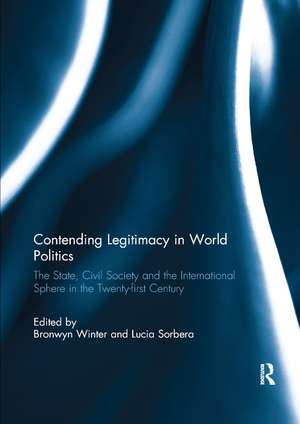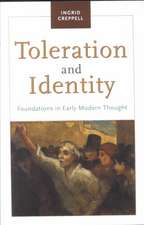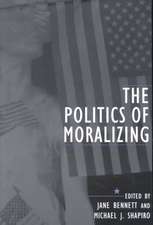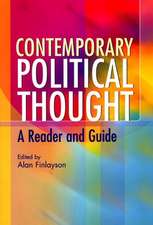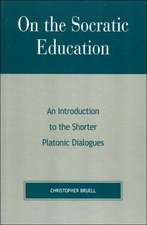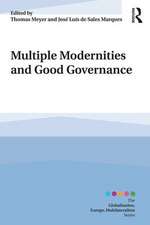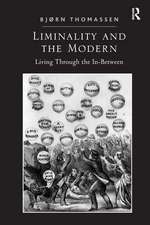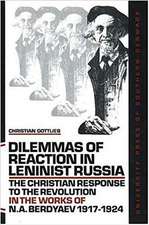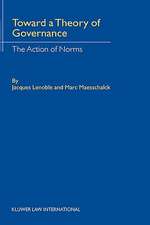Contending Legitimacy in World Politics: The State, Civil Society and the International Sphere in the Twenty-first Century
Editat de Bronwyn Winter, Lucia Sorberaen Limba Engleză Paperback – 12 dec 2019
| Toate formatele și edițiile | Preț | Express |
|---|---|---|
| Paperback (1) | 178.51 lei 43-57 zile | |
| Taylor & Francis – 12 dec 2019 | 178.51 lei 43-57 zile | |
| Hardback (1) | 496.94 lei 43-57 zile | |
| Taylor & Francis – 17 oct 2017 | 496.94 lei 43-57 zile |
Preț: 178.51 lei
Preț vechi: 215.60 lei
-17% Nou
Puncte Express: 268
Preț estimativ în valută:
34.16€ • 35.53$ • 28.20£
34.16€ • 35.53$ • 28.20£
Carte tipărită la comandă
Livrare economică 14-28 aprilie
Preluare comenzi: 021 569.72.76
Specificații
ISBN-13: 9780367889265
ISBN-10: 0367889269
Pagini: 236
Dimensiuni: 174 x 246 mm
Greutate: 0.44 kg
Ediția:1
Editura: Taylor & Francis
Colecția Routledge
Locul publicării:Oxford, United Kingdom
ISBN-10: 0367889269
Pagini: 236
Dimensiuni: 174 x 246 mm
Greutate: 0.44 kg
Ediția:1
Editura: Taylor & Francis
Colecția Routledge
Locul publicării:Oxford, United Kingdom
Public țintă
Postgraduate and UndergraduateCuprins
Introduction 1. Debating Legitimacy Transnationally 2. Reply: Legitimacy and the shadows of universalism: a response to Meine’s ‘debating legitimacy transnationally" 3. The discursive (de)legitimisation of global governance: political contestation and the emergence of new actors in the WTO’s Dispute Settlement Body 4. Reply: Political contestation and the emergence of new actors, but who governs? A response to Michael Strange 5. Resisting legitimacy: Weber, Derrida, and the fallibility of sovereign power 6. Reply: The sovereignty of sovereignty and the restricted object of critical IR 7. The evolving and interacting bases of EU environmental policy legitimacy 8. Reply: The evolving and interacting bases of EU environmental policy legitimacy: a reply to Brown 9. Do Catalans have ‘the right to decide’? Secession, legitimacy and democracy in twenty-first century Europe 10. Reply: Scotland, Catalonia and the ‘right’ to self-determination: a comment suggested by Kathryn Crameri’s ‘Do Catalans Have the "right to decide"?’ 11. Building authoritarian ‘legitimacy’: domestic compliance and international standing of Bashar al-Asad’s Syria 12. Reply: Reply to ‘Building authoritarian "legitimacy": domestic compliance and international standing of Bashar al-Asad’s Syria’ by Aurora Sottimano Mathieu Rey13. Looking for a new legitimacy: internal challenges within the Israeli Left 14. Reply: The Israeli Left: Part of the problem or the Solution? 15. Body Politics and Legitimacy. Towards a Feminist Epistemology of the Egyptian Revolution 16. Reply: De-orientalizing sexual violence and gender discrimination in Egypt 17. Women’s human rights and Tunisian upheavals: is ‘democracy’ enough? 18. Reply: A reply to ‘Women’s human rights and Tunisian upheavals: is "democracy" enough?’ by Bronwyn Winter
Notă biografică
Bronwyn Winter is Deputy Director of European Studies at the University of Sydney. Her publications include September 11, 2001: Feminist Perspectives (Spinifex 2002), Hijab and the Republic (Syracuse UP 2008), and Women, Insecurity and Violence in a Post-9/11 World (Syracuse UP 2017).
Lucia Sorbera is Senior Lecturer in the Department of Arabic Language and Cultures at the University of Sydney. Her publications include: Challenges of thinking feminism and revolution in Egypt between 2011 and 2014’, in Post-Colonial Studies, 17, 1 (2014); ‘Early Reflections of an Historian on Feminism in Egypt in Times of Revolution’, in Genesis, XII/1, 2013; ‘Between Cooptation and Resistance: Women’s Leadership and Gender Discourse in Contemporary Egypt’, in Luca Anceschi, Gennaro Gervasio, Andrea Teti (eds.), Hidden Geographies. Informal Powers in the Greater Middle East, Routledge, UK (2014).
Descriere
The idea of political legitimacy seems to have a quasi-unimpeachable moral weight, but this book challenges the term – who uses it, to what end in what contexts? Within what logical, political, legal, economic, cultural or ideological frameworks are actions deemed to be legitimate or illegitimate?
This book was originally publish
This book was originally publish
